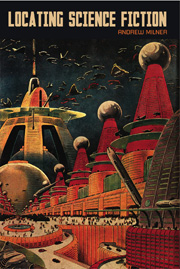Book contents
- Frontmatter
- Contents
- Acknowledgements
- List of Figures
- 1 Memories of Dan Dare
- 2 Science Fiction and Selective Tradition
- 3 Science Fiction and the Cultural Field
- 4 Radio Science Fiction and the Theory of Genre
- 5 Science Fiction, Utopia and Fantasy
- 6 Science Fiction and Dystopia
- 7 When Was Science Fiction?
- 8 Where Was Science Fiction?
- 9 The Uses of Science Fiction
- Works Cited
- Index
8 - Where Was Science Fiction?
- Frontmatter
- Contents
- Acknowledgements
- List of Figures
- 1 Memories of Dan Dare
- 2 Science Fiction and Selective Tradition
- 3 Science Fiction and the Cultural Field
- 4 Radio Science Fiction and the Theory of Genre
- 5 Science Fiction, Utopia and Fantasy
- 6 Science Fiction and Dystopia
- 7 When Was Science Fiction?
- 8 Where Was Science Fiction?
- 9 The Uses of Science Fiction
- Works Cited
- Index
Summary
Although heavily weighted towards England, France and the United States, the British Library's 2011 Out of This World exhibition, cited in the previous chapter, clearly presented a version of the history of SF that not only reached back to classical antiquity, but also stretched across Eurasia and North America, from the Japanese Haruki Murakami's Sekai no owari to hādo-boirudo wandārando (Hard-Boiled Wonderland and the End of the World) to the Canadian Margaret Atwood's Oryx and Crake and The Year of the Flood (Ashley, 2011, 66, 114). Germany, Poland, Russia and Czechoslovakia were all comparatively well represented; on 9 September the Library even hosted an ‘Out of This World Event’ on Lem, in association with the Polish Cultural Institute; Enrique Gaspar y Rimbau's El Anacronópete was acknowledged as pre-dating Wells's ‘The Chronic Argonauts’ by a year (Ashley, 2011, 50); and at least one Australian SF writer rated a mention, Greg Egan, for Permutation City (Ashley, 2011, 71). Although fan-based World Science Fiction Conventions were first organised in the United States and remain heavily weighted towards that country, they have now also been held in Canada since 1948, in England since 1957, Germany since 1970, Australia since 1975, the Netherlands since 1990, Scotland since 1995 and Japan since 2007. From the most academically legitimated institutions through to the most fan-legitimated, the genre is, then, slowly becoming increasingly aware of itself as transcending national boundaries.
- Type
- Chapter
- Information
- Locating Science Fiction , pp. 155 - 177Publisher: Liverpool University PressPrint publication year: 2012



